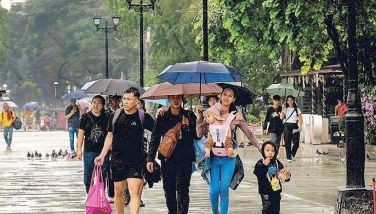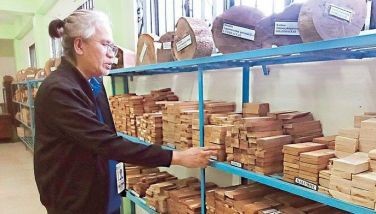Churches still full despite bomb threats
October 21, 2002 | 12:00am
Christians continued to flock to their places of worship yesterday despite text messages warning that terrorists were planning to bomb churches.
"Like any other Sunday, the church is still fully packed," churchgoer Victorio Garcia said in Filipino after attending Mass at the San Lorenzo Ruiz Basilica in Binondo.
"You cannot stop Catholics from going to church despite the bomb threat," he added, echoing President Arroyo’s appeal for calm a day after a bomb exploded inside a passenger bus near Balintawak, Quezon City, killing two passengers and wounding 19 others.
Police suspect the bombing was committed by local members of the Indonesia-based Jemaah Islamiyah (JI), an Islamist group linked with the al-Qaeda terrorist network.
The JI is believed to be responsible for the Dec. 30, 2000 or Rizal Day bombings in Metro Manila that killed 21 people and injured at least a hundred.
On Christmas Eve of the same year, the JI was also believed to be responsible for the bombings of churches in nine Indonesian cities that killed 18 people and injured more than 100.
Indonesian authorities have arrested radical Muslim cleric Abubakar Ba’asyir, 64, in a hospital in Solo city after a host of nations protested Indonesia’s position on terrorism.
Jakarta has come under strong international pressure to pursue the case against Ba’asyir, who makes no secret of his support for Islamic fundamentalism.
In January, authorities arrested Indonesian Roman Fathur al-Ghozi, who later admitted planning the Dec. 30 bombings. His arrest led to the seizure of 1.5 tons of explosives.
National Security Adviser Roilo Golez said police told him that bomb fragments indicated that the explosive was the same type used in the Rizal Day bombings.
The Rizal Day blasts hit the Light Railway Transit station in Blumentritt, Manila, a bus in Cubao, Quezon City, Plaza Ferguson in Manila, an abandoned gas station on EDSA in Makati City and a warehouse at the Ninoy Aquino International Airport in Parañaque City.
"Like any other Sunday, the church is still fully packed," churchgoer Victorio Garcia said in Filipino after attending Mass at the San Lorenzo Ruiz Basilica in Binondo.
"You cannot stop Catholics from going to church despite the bomb threat," he added, echoing President Arroyo’s appeal for calm a day after a bomb exploded inside a passenger bus near Balintawak, Quezon City, killing two passengers and wounding 19 others.
Police suspect the bombing was committed by local members of the Indonesia-based Jemaah Islamiyah (JI), an Islamist group linked with the al-Qaeda terrorist network.
The JI is believed to be responsible for the Dec. 30, 2000 or Rizal Day bombings in Metro Manila that killed 21 people and injured at least a hundred.
On Christmas Eve of the same year, the JI was also believed to be responsible for the bombings of churches in nine Indonesian cities that killed 18 people and injured more than 100.
Indonesian authorities have arrested radical Muslim cleric Abubakar Ba’asyir, 64, in a hospital in Solo city after a host of nations protested Indonesia’s position on terrorism.
Jakarta has come under strong international pressure to pursue the case against Ba’asyir, who makes no secret of his support for Islamic fundamentalism.
In January, authorities arrested Indonesian Roman Fathur al-Ghozi, who later admitted planning the Dec. 30 bombings. His arrest led to the seizure of 1.5 tons of explosives.
National Security Adviser Roilo Golez said police told him that bomb fragments indicated that the explosive was the same type used in the Rizal Day bombings.
The Rizal Day blasts hit the Light Railway Transit station in Blumentritt, Manila, a bus in Cubao, Quezon City, Plaza Ferguson in Manila, an abandoned gas station on EDSA in Makati City and a warehouse at the Ninoy Aquino International Airport in Parañaque City.
BrandSpace Articles
<
>
- Latest
- Trending
Trending
Latest
Trending
Latest
Recommended






























